1061 scholarly books by Catholic University of America Press and 64
have author last names that start with R
1061 scholarly books by Catholic University of America Press and 64
1061 scholarly books by Catholic University of America Press
64 have author last names that start with R have author last names that start with R
64 have author last names that start with R have author last names that start with R
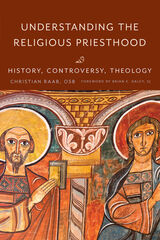
Understanding the Religious Priesthood
History, Controversy, Theology
Christian, OSB Raab
Catholic University of America Press, 2020
Most contemporary theologies of Holy Orders consider priesthood mainly in its diocesan context and most contemporary theologies of religious life do not consider how ordained ministry functions when it is internal rather than external to religious life. Understanding the Religious Priesthood provides a history and theology of religious priesthood that contributes to our understanding of this vocation’s identity and mission. It uncovers what religious priesthood shares with diocesan priesthood and non-ordained religious life and what makes it different from both those other vocations.
Christian Raab begins by tracing the history of religious priesthood from its origins in the early Church to the eve of the Second Vatican Council. He demonstrates that religious priests often faced questions about how to reconcile their two callings, but that they also provided answers in their theologies and spiritualities of priesthood and religious life. Meanwhile, they made key contributions to the Church’s life and mission. Raab then investigates the teachings of the Second Vatican Council on priesthood and religious life. Observing that the Council presented priesthood according to a diocesan typology and presented religious life without sacerdotal associations, he argues that the lack of imagery of religious priesthood contributed to a post-conciliar vocational identity crisis among religious priests. He then seeks to remedy this lacuna by appealing to the biblical images for religious priesthood Hans Urs von Balthasar offered in his theology of vocations. Raab argues that Balthasar’s imagery is a promising way forward for understanding the identity and mission of religious priesthood. In a final part, Raab provides a substantial theological articulation of religious priesthood which illuminates its liturgical signification, ecclesial mediation and mission, and ministerial identity. Here he draws not only from Balthasar but also from Pope John Paul II, Yves Congar, Jean-Marie Tillard, Brian Daley, and Guy Mansini to construct his profile.
[more]

Catholic Collecting
Catholic Reflection 1538-1850: Objects as a Measure of Reflection on a Catholic Past and the Construction of Recusant Identity in England and America
Virginia C. Raguin
Catholic University of America Press, 2006
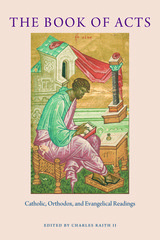
The Book of Acts
Charles Raith II
Catholic University of America Press, 2019
The Book of Acts brings together leading Catholic, Orthodox, and Evangelical theologians to read and interpret the book of Acts from within their ecclesial tradition, while simultaneously engaging one another in critical dialogue. Combining both theological exegesis and ecumenical dialogue, each chapter is uniquely structured to facilitate a rich reading of Scripture and an engaging though critical dialogue across the traditions. Each chapter begins with a main essay by either a Catholic, Orthodox, or Evangelical theologian on a section of the book of Acts; the main essay is followed by responses from theologians of the other two traditions. The chapter concludes with a final response from the main author. Readers are thus provided with not only a deep and engaging reading of the book of Acts but also the unfolding of a rich theological-ecumenical dialogue centered on Scripture. Anyone interested in understanding how our ecclesial traditions inform our reading of Scripture would do well to read this book, as would anyone interested in the book of Acts, ecumenical dialogue, and the theological interpretation of Scripture
[more]
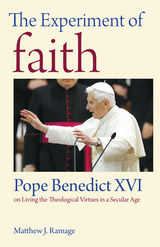
The Experiment of Faith
Pope Benedict XVI on Living the Theological Virtues in a Secular Age
Ramage
Catholic University of America Press, 2020
Pope Benedict XVI memorably remarked that the Christian faith is a lot like a Gothic cathedral with its stained-glass windows. From the outside, the Church can appear dark, dreary, and worn with age—the crumbling relic of an institution that no longer speaks to men and women living in our modern world. Indeed, for many people today, Christian morality with all of its commandments appears to be a source not of life and joy but instead of suffering and oppression. Even within the Church, many wonder: why should I submit to ancient doctrines and outdated practices that restrict my freedom and impede my happiness?
In this timely and original book, his third exploring the riches of Benedict XVI’s vast corpus, theologian Matthew Ramage sets out to meet this challenge with an in-depth study of the emeritus pontiff’s wisdom on how to live Christian discipleship in today’s increasingly secularized world. Taking as his starting point Benedict’s conviction that the truth of Christianity—like the beauty of a cathedral’s glorious windows—can be grasped only from the inside, Ramage draws on Benedict’s insights to show how all Christians can make the “experiment of faith” by living the theological virtues of faith, hope, and charity in daily life. Along the way, he shares his personal reflections on how Benedict’s wisdom has helped him to navigate difficulties in embracing the faith and provides a way forward to those struggling to live as disciples in a way that is intellectually serious without remaining merely intellectual. In so doing, he also presents a highly nuanced yet accessible approach to defending the truth of the gospel in a world where life in Jesus Christ tends to be seen as unfulfilling, irrelevant, or just one lifestyle choice among others.
[more]
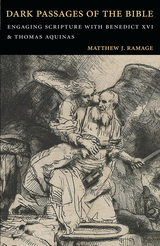
Dark Passages of the Bible
Matthew J. Ramage
Catholic University of America Press, 2013
Following the lead of Pope Benedict XVI, in Dark Passages of the Bible Matthew Ramage weds the historical-critical approach with a theological reading of Scripture based in the patristic-medieval tradition. Whereas these two approaches are often viewed as mutually exclusive or even contradictory, Ramage insists that the two are mutually enriching and necessary for doing justice to the Bibles most challenging texts.
[more]
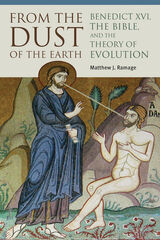
From the Dust of the Earth
Benedict XVI, the Bible , and the Theory of Evolution
Matthew J. Ramage
Catholic University of America Press, 2022
The claim that evolution undermines Christianity is standard fare in our culture. Indeed, many today have the impression that the two are mutually exclusive and that a choice must be made between faith and reason—rejecting Christianity on the one hand or evolutionary theory on the other. Is there a way to square advances in this field of study with the Bible and Church teaching?
In this book—his fourth dedicated to applying Joseph Ratzinger/Benedict XVI’s wisdom to pressing theological difficulties—Matthew Ramage answers this question decidedly in the affirmative. Distinguishing between evolutionary theory properly speaking and the materialist attitude that is often conflated with it, Ramage’s work meets the challenge of evolutionary science to Catholic teaching on human origins, guided by Ratzinger’s conviction that faith and evolutionary theory mutually enrich one another.
Pope Benedict gifted the Church with many pivotal yet often-overlooked resources for engaging evolution in the light of faith, especially in those instances where he addressed the topic in connection with the Book of Genesis. Ramage highlights these contributions and also makes his own by applying Ratzinger’s principles to such issues as the meaning of man’s special creation, the relationship between sin and death, and the implications of evolution for eschatology. Notably, Ramage shows that many apparent conflicts between Christianity and evolutionary theory lose their force when we interpret creation in light of the Paschal Mystery and fix our gaze on Jesus, the New Adam who reveals man to himself.
Readers of this text will find that it does more than merely help to resolve apparent contradictions between faith and modern science. Ramage’s work shows that discoveries in evolutionary biology are not merely difficulties to be overcome but indeed gifts that yield precious insight into the mystery of God’s saving plan in Christ.
[more]
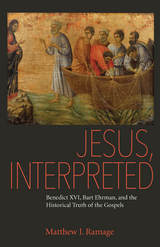
Jesus, Interpreted
Matthew J. Ramage
Catholic University of America Press, 2017
In this sequel volume to his Dark Passages of the Bible (CUA Press, 2013), author Matthew Ramage turns his attention from the Old to the New Testament, now tackling truth claims bearing directly on the heart of the Christian faith cast into doubt by contemporary New Testament scholarship: Did God become man in Jesus, or did the first Christians make Jesus into God? Was Jesus' resurrection a historical event, or rather a myth fabricated by the early Church? Will Jesus indeed return to earth on the last day, or was this merely the naïve expectation of ancient believers that reasonable people today ought to abandon?
[more]
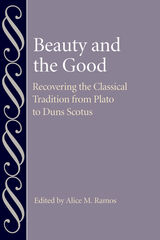
Beauty and the Good
Recovering the Classical Tradition from Plato to Duns Scotus
Alice M. Ramos
Catholic University of America Press, 2021
In the past twenty years or more, there has been a growing interest among philosophers and theologians alike in the transcendentals and especially in the beautiful. This seems fortuitous since so much of contemporary culture is fixated in many ways on beauty, on what might be called a superficial or man-made beauty, intent on outward appearance, with little or no concern for the human person’s interiority and distinctive nature. The Ancients and the Medievals, on the contrary, were sensitive not only to the beauty of nature and art but also to beauty as intelligible, that is, to the beauty of moral harmony and of metaphysical splendor. While the question of whether the beautiful is in fact a transcendental aspect of being continues to be a subject of dispute in contemporary scholarship, the relationship between the beautiful and the good has been accepted since ancient times and has been attended to in recent publications. None of these publications, however, offers a systematic treatment of this relationship by drawing from the wisdom of both ancient and medieval thought in such a way as to bring together the work of scholars in this tradition.
Beauty and the Good intends therefore to make a singular contribution by presenting a richer alternative to the contemporary cult of beauty and appearance on the one hand, and to the concomitant decline of real beauty on the other hand. In addition to highlighting the centrality of beauty in the Aristotelian account of moral virtue, where virtue is kalon and virtuous actions are done for the sake of kalon—an account which is found echoed in the medieval notion of intrinsic goodness (bonum honestum), understood as intelligible or spiritual beauty—this volume will provide the metaphysical and theological grounding for beauty, as influenced in part by Plato and Neoplatonism, together with a much needed account of how we know and judge beauty, and how for the recognition of true good and real beauty we need to be properly disposed. The integration of philosophical and theological reflection on the nature and relationship of beauty and the good, on our perception and judgment of beauty and of the good as beautiful, and on the motivational role of beauty in human action has as its goal to produce a coherent volume of essays.
[more]
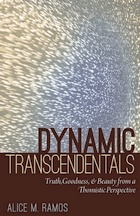
Dynamic Transcendentals
Truth, Goodness, and Beauty from a Thomistic Perspective
Alice M. Ramos
Catholic University of America Press, 2012
Addressing contemporary interest in the relationship between metaphysics and ethics, as well as the significance of beauty for ethics, Alice Ramos presents an accessible study of the transcendentals and provides a dynamic rather than static view of truth, goodness, and beauty.
[more]
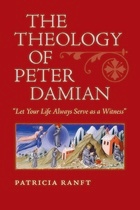
Theology of Peter Damian
Patricia Ranft
Catholic University of America Press, 2012
In the first comprehensive work based wholly on critical editions of Damian's writings, Ranft explores all 180 letters of Damian and his vita of Romuald.
[more]
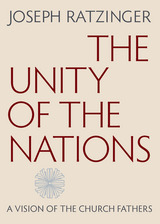
The Unity of the Nations
Joseph Ratzinger
Catholic University of America Press, 2015
What did ancient Christians and pagans believe makes the unity of the nations? Just as he began serving as a major adviser at the Second Vatican Council in 1962, Joseph Ratzinger (the future Pope Benedict XVI) studied this question in lectures delivered at Austria's University of Salzburg. These lectures, originally published in German, are now made available in English in this volume.
[more]
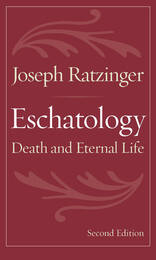
Eschatology
Death and the Eternal Life (Second Edition)
Joseph Ratzinger
Catholic University of America Press, 2007
Originally published in English in 1988, Joseph Ratzinger's Eschatology remains internationally recognized as a leading text on the "last things"—heaven and hell, purgatory and judgment, death and the immortality of the soul. This highly anticipated second edition includes a new preface by Joseph Ratzinger/Pope Benedict XVI and a supplement to the bibliography by theologian Peter A. Casarella.
Eschatology presents a balanced perspective of the doctrine at the center of Christian belief—the Church's faith in eternal life. Recognizing the task of contemporary eschatology as "to marry perspectives, so that person and community, present and future, are seen in their unity," Joseph Ratzinger brings together recent emphasis on the theology of hope for the future with the more traditional elements of the doctrine. His book has proven to be as timeless as it is timely.
[more]
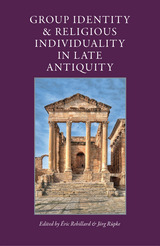
Group Identity and Religious Individuality in Late Antiquity
Eric Rebillard
Catholic University of America Press, 2015
To understand the past, we necessarily group people together and, consequently, frequently assume that all of its members share the same attributes. In this ground-breaking volume, Eric Rebillard and Jörg Rüpke bring renowned scholars together to challenge this norm by seeking to rediscover the individual and to explore the dynamics between individuals and the groups to which they belong.
[more]
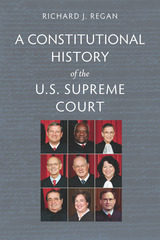
A Constitutional History of the U.S. Supreme Court
Richard Regan
Catholic University of America Press, 2015
The Supreme Courts decisions concerning the first amendment are hotly debated, and the controversy shows no signs of abating as additional cases come before the court. Adding much-needed historical and philosophical background to the discussion, Richard J. Regan reconsiders some of the most important Supreme Court cases regarding the establishment clause and the free exercise of religion.
[more]
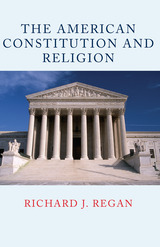
The American Constitution and Religion
Richard J. Regan
Catholic University of America Press, 2013
The Supreme Courts decisions concerning the first amendment are hotly debated, and the controversy shows no signs of abating as additional cases come before the court. Adding much-needed historical and philosophical background to the discussion, Richard J. Regan reconsiders some of the most important Supreme Court cases regarding the establishment clause and the free exercise of religion.
[more]
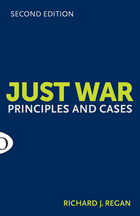
Just War, Second Edition
Richard J. Regan
Catholic University of America Press, 2013
Bringing just war doctrine to life, Richard J. Regan raises a host of difficult questions about the evils of war, asking first and foremost whether war is ever justified, and, if so, for what purposes? Regan considers the basic principles of just war theory and applies those principles to historical and ongoing conflicts through case studies and discussion questions. His well-received 1996 work is updated with the addition of case studies on Iraq, Afghanistan, Libya, and Islamist terrorist organizations. Especially timely are the added discussions of the use of drones to assassinate terrorist leaders and, in the matter of weapons of mass destruction, asking how certain is "certain enough" that a country has weapons of mass destruction before it can be justly attacked? Regan considers the roles of the president, Congress, and the U.N. Security Council in determining when long-term U.S. military involvement is justified.
[more]

Just War
Principles and Cases
Richard J. Regan
Catholic University of America Press, 1996
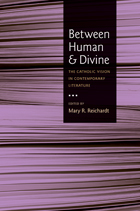
Between Human and Divine
The Catholic Vision in Contemporary Literature
Mary Reichardt
Catholic University of America Press, 2010
Between Human and Divine is the first collection of scholarly essays published on a wide variety of contemporary (post 1980) Catholic literary works and artists. Its aim is to introduce readers to recent and emerging writers and texts in the tradition.
[more]
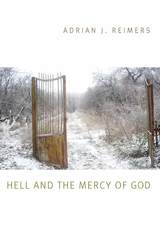
Hell and the Mercy of God
Adrian J. Reimers
Catholic University of America Press, 2017
If God is truly merciful and loving, perfect in goodness, how can he consign human beings created in his own image to eternal torment in hell? God’s goodness seems incompatible with inflicting horrible evil upon those who oppose his will and defy his law. If to this paradox we add the metaphysical requirement that God be perfect in goodness, the eternal evil of hell seems to be contradictory to God’s own nature.
Catholic philosopher Adrian Reimers takes on these challenges in Hell and the Mercy of God, drawing on relevant sources from Aristotle to Aquinas, from Dante to Tolkien, from Wagner to John Paul II, along with Billie Holliday, The Godfather, and the music of George Gershwin. He presents a philosophical theology, grounded in Scripture, of the nature of goodness and evil, exploring various types of pain, the seven capital sins, the resurrection of the body, the meaning of mammon, the core meaning of idolatry, the psychology of Satan and those who choose his path, and the moral responsibility of the human person.
These reflections illuminate the intelligibility of orthodox Catholic teachings on the goodness of God and the reality of hell. Hell is not an arbitrary imposition set up for human rule-breakers but a continuation of a freely chosen way of life manifest even in this world. Examples from history, art, and contemporary culture lead the author to conclude that anyone who does not believe in the reality of hell is not paying enough attention. And yet, mercy and hope remain triumphant, because, just as Christ offers entrance into paradise to the “good thief” Dismas on the cross, God continues to offer repentance and salvation to all who live.
Catholic philosopher Adrian Reimers takes on these challenges in Hell and the Mercy of God, drawing on relevant sources from Aristotle to Aquinas, from Dante to Tolkien, from Wagner to John Paul II, along with Billie Holliday, The Godfather, and the music of George Gershwin. He presents a philosophical theology, grounded in Scripture, of the nature of goodness and evil, exploring various types of pain, the seven capital sins, the resurrection of the body, the meaning of mammon, the core meaning of idolatry, the psychology of Satan and those who choose his path, and the moral responsibility of the human person.
These reflections illuminate the intelligibility of orthodox Catholic teachings on the goodness of God and the reality of hell. Hell is not an arbitrary imposition set up for human rule-breakers but a continuation of a freely chosen way of life manifest even in this world. Examples from history, art, and contemporary culture lead the author to conclude that anyone who does not believe in the reality of hell is not paying enough attention. And yet, mercy and hope remain triumphant, because, just as Christ offers entrance into paradise to the “good thief” Dismas on the cross, God continues to offer repentance and salvation to all who live.
[more]
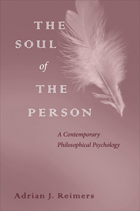
The Soul of the Person
A Contemporary Philosophical Psychology
Adrian J. Reimers
Catholic University of America Press, 2006
The Soul of the Person is a contemporary account of the metaphysical basis for the transcendence of the human person. In being directed toward truth, beauty, and goodness, the human person transcends the physical order and reveals himself as a spiritual, as well as a material, being.
[more]
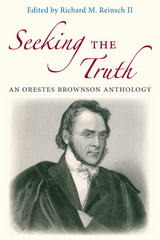
Seeking the Truth
Richard Reinsch II
Catholic University of America Press, 2016
This anthology of essays from the great nineteenth-century thinker Orestes A. Brownson will engage the reader with key writings from one of the most compelling American Catholic intellectuals. Brownson was a spiritual seeker who migrated through Presbyterianism, Universalism, skepticism, Unitarianism, and Transcendentalist thought, and finally at age 41 to Catholicism. Politically he found himself anticipating socialism in the 1830s, then, turning into a disciple of John Calhoun's states rights constitutionalism, and later he incorporated his criticisms of mass democracy into a unique philosophical defense of the Constitution that emerged in full bloom during the Civil War.
[more]
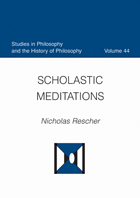
Scholastic Meditations
Nicholas Rescher
Catholic University of America Press, 2005
The studies gathered in this volume seek to do homage to the spirit of Scholasticism. They address key issues in that tradition--some from an historical point of view, others from a more substantive standpoint.
[more]
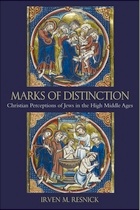
Marks of Distinctions
Christian Perceptions of Jews in the High Middle Ages
Irven M. Resnick
Catholic University of America Press, 2012
Through the use of several illustrations from illuminated manuscripts and other media, Resnick engages readers in a discussion of the later medieval notion of Jewish difference.
[more]
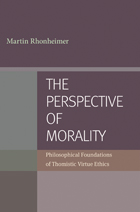
The Perspective of Morality
Philosophical Foundations of Thomistic Virtue Ethics
Martin Rhonheimer
Catholic University of America Press, 2011
The Perspective of the Acting Person introduces readers to one of the most important and provocative thinkers in contemporary moral philosophy
[more]
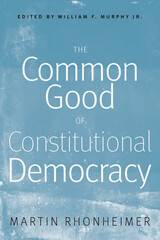
The Common Good of Constitutional Democracy
Essays in Political Philosophy and on Catholic Social Teaching
Martin Rhonheimer
Catholic University of America Press, 2013
The Common Good of Constitutional Democracy offers a rich collection of essays in political philosophy by Swiss philosopher Martin Rhonheimer. Like his other books in both ethical theory and applied ethics, which have recently been published in English, the essays included are distinguished by the philosophical rigor and meticulous attention to the primary and secondary literature of the various topics discussed
[more]
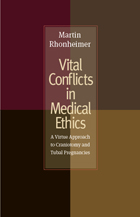
Vital Conflicts in Medical Ethics
A Virtue Approach to Craniotomy and Tubal Pregnancies
Martin Rhonheimer
Catholic University of America Press, 2009
Vital Conflicts in Medical Ethics by renowned Swiss philosopher Martin Rhonheimer considers some of the most difficult and disputed questions in Catholic moral theology
[more]
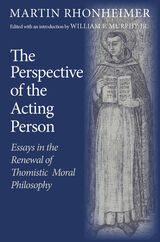
The Perspective of the Acting Person
Essays in the Renewal of Thomistic Moral Philosophy
Martin Rhonheimer
Catholic University of America Press, 2008
The Perspective of the Acting Person introduces readers to one of the most important and provocative thinkers in contemporary moral philosophy
[more]
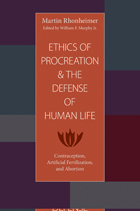
Ethics of Procreation and the Defense of Human Life
Contraception, Artficial Fertilization, and Abortion
Martin Rhonheimer
Catholic University of America Press, 2010
Building on the renewal of Thomistic ethics encouraged by key moral encyclicals including Humanae Vitae, Veritatis Splendor, and Evangelium Vitae, Swiss philosopher Martin Rhonheimer revisits some of the most difficult questions regarding the ethics of procreation and human life.
[more]
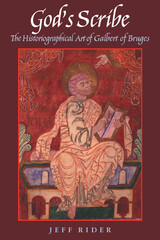
God's Scribe
The Historiographical Art of Galbert of Bruges
Jeff Rider
Catholic University of America Press, 2001
Intended as a companion volume to the De multro, the book provides an outline of the Flemish crisis of 1127-28 and summarizes what is known about Galbert. It traces the elaboration of the De multro from a set of wax notes to a nearly completed chronicle.
[more]
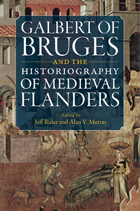
Galbert of Bruges and the Historiography of Medieval Flanders
Jeff Rider
Catholic University of America Press, 2009
Edited by two of the world's most prominent specialists on Galbert today, Jeff Rider and Alan V. Murray, this book brings together essays by established scholars who have been largely responsible for the radical changes in the understanding of Galbert and his work that have occurred over the last thirty years and essays by younger scholars.
[more]
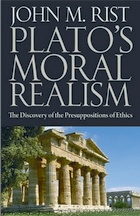
Plato's Moral Realism
The Discovery of the Presuppositions of Ethics
John M. Rist
Catholic University of America Press, 2012
Surveying many of Plato's dialogues from the early, middle, and late periods, prominent philosopher John M. Rist shows how Plato gradually came to realize the need for metaphysics to support his ethical position and that a rigorous ethics required a secure metaphysics grounded in universal values.
[more]
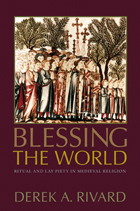
Blessing the World
Ritual and Lay Piety in Medieval Religion
Derek A. Rivard
Catholic University of America Press, 2009
In Blessing the World, Derek A. Rivard studies liturgical blessing and its role in the religious life of Christians during the central and later Middle Ages, with a particular focus on the blessings of the Franco-Roman liturgical tradition from the tenth to late thirteenth centuries.
[more]
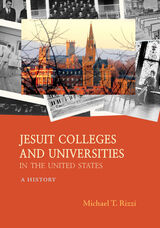
Jesuit Colleges and Universities in the United States
A History
Michael T. Rizzi
Catholic University of America Press, 2022
Jesuit Colleges and Universities in the United States provides a comprehensive history of Jesuit higher education in the United States, weaving together the stories of the fifty-four colleges and universities that the Jesuits have operated (successfully and unsuccessfully) since 1789. It emphasizes the connections among the institutions, exploring how certain Jesuit schools like Georgetown University gave birth to others like Boston College by sharing faculty, financial resources, accreditation, and even presidents throughout their history. The book also explores how the colleges responded to common challenges – including anti-Catholic prejudice in the United States, the push from government authorities to modernize their shared curriculum, and the pull from Roman authorities to remain loyal to Catholic tradition.
The story is comprehensive, covering the colonial era to the present, and takes a fresh look at themes like the rise of the research university in the 1880s and the administrative reforms of the 1960s. It also provides a modern and timely perspective on the role of Jesuit colleges in racial justice, women’s education, and other civil rights issues, drawing attention to underappreciated Jesuit contributions in these areas. It draws from both published and archival sources on the history of each institution to construct a single narrative, identifying common themes, challenges, and trends. Through the eyes of Jesuit colleges, it traces the evolution of American higher education and the role of Catholics in the United States over more than two centuries.
[more]
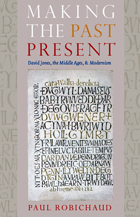
Making the Past Present
David Jones, the Middle Ages and Modernism
Paul Robichaud
Catholic University of America Press, 2007
Robichaud charts the growth of Jones's medievalism from his earliest Pre-Raphaelite influences, showing how his commitment to modernist aesthetics transformed his vision of the Middle Ages.
[more]
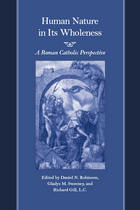
Human Nature in Its Wholeness
A Roman Catholic Perspective
Daniel N. Robinson
Catholic University of America Press, 2006
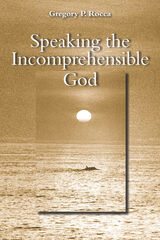
Speaking the Incomprehensible God
Thomas Aquinas on the Interplay of Positive and Negative Theology
Gregory P. Rocca O.P.
Catholic University of America Press, 2004
Gregory Rocca's nuanced discussion prevents Aquinas's thought from being capsulized in familiar slogans and is an antidote to unilateralist or monochrome views about God-talk.
[more]
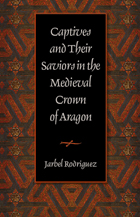
Captives and Their Saviors in the Medieval Crown of Aragon
Jarbel Rodriguez
Catholic University of America Press, 2007
Captives and Their Saviors in the Medieval Crown of Aragon argues that by this time the ransoming efforts were on a kingdom-wide scale engaging not only professional ransomers, merchants, and officials of the crown but the population at large.
[more]
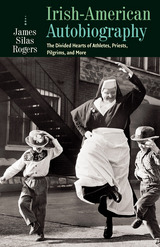
Irish-American Autobiography
James Silas Rogers
Catholic University of America Press, 2016
Irish-American Autobiography opens a new window on the shifting meanings of Irishness over the twentieth century, by looking at a range of works that have never before been considered as a distinct body of literature. Opening with celebrity memoirs from athletes like boxer John L. Sullivan and ballplayer Connie Mack - written when the Irish were eager to put their raffish origins behind them - later chapters trace the many tensions, often unspoken, registered by Irish Americans who've told their life stories. New York saloonkeepers and South Boston step dancers set themselves against the larger culture, setting a pattern of being on the outside looking in. Even the classic 1950s TV comedy The Honeymooners speaks to the urban Irish origins, and the poignant sense of exclusion felt by its creator Jackie Gleason. Catholicism, so key to the identity of earlier generations of Irish Americans, has also evolved. One chapter looks at the painful diffidence of priest autobiographers, and others reveal how traditional Irish Catholic ideas of the guardian angel and pilgrimage have evolved and stayed potent down to our own time. Irish-American Autobiography becomes, in the end, a story of a continued search for connection - documenting an "ethnic fade" that never quite happened.
[more]
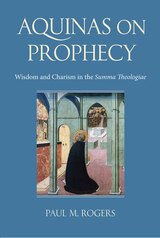
Aquinas on Prophecy
Wisdom and Charism in the Summa Theologiae
Paul M. Rogers
Catholic University of America Press, 2023
Aquinas on Prophecy argues that a lacuna exists (especially among Anglophone scholars of Aquinas) that neglects to identify his most famous work as a prophetic witness to the transformative effect of Christian theology. Through a detailed examination of Aquinas’s treatment of prophecy in the Summa Theologiae (II-II, QQ.171-174), Paul Rogers reveals how prophetic testimony is central to the understanding of Christian revelation, faith, and theology, since it presents an initial (and historically-rooted) model for a Christian pedagogy that attempts to affect intellectual and moral transformation through communicating knowledge about God.
The theologian thus conceived by Aquinas exercises analogously a prophetic, and hence social, function among Christian believers that has a special care for their spiritual and moral guidance. In contrast to readings of Aquinas that portray him as overly reliant on Aristotelian gnoseology (e.g., Jenkins 1997), Rogers lays out a reading more in line with recent ‘ressourcement’ Thomistic interpreters that identifies in his account of prophecy a creative adaptation of Arabic-Aristotelian gnoseology in the service of clarifying difficulties that had arisen in the thirteenth century surrounding the reception of a patristic (and predominantly Augustinian) tradition of prophetic illumination or vision. In the hands of Aquinas, the traditional Augustinian theory of prophetic illumination was re-envisioned and reinvigorated, which in turn allowed him to reassert confidently prophecy’s status as certain knowledge (scientia) that required its own distinct ‘light’, comparable to the light of natural reason and the lights of faith and glory.
Highlighting prophecy in Aquinas’s thought helps especially to refocus today’s readers on how knowledge of the final end as revealed was for Aquinas the ultimate moral objective shared by both the prophet and theologian: a point that is best appreciated when his account of prophecy is related back to his understanding of sacred doctrine and faith as a whole—the book’s central task.
[more]
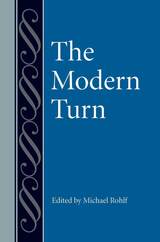
The Modern Turn
Michael Rohlf
Catholic University of America Press, 2017
What is the modern turn in philosophy? In other words, what are the features that make modern philosophy distinctively “modern” in contrast with the pre-modern philosophy from which it emerged – for example, medieval scholasticism, Renaissance philosophy, and ancient Greek and Roman thought? How did the modern turn in philosophy transpire? That is, what did specific philosophers contribute that shaped the distinctive character of modern philosophy? The twelve essays in this volume seek to address these questions, and in doing so they exemplify and contribute to a rich debate about the nature and value of modern philosophy.
This volume approaches the modern turn not as an event that occurred all at once, but rather as a series of shifts in different areas of philosophy at different times. The essays are arranged broadly in chronological order of the topics they treat. Among the themes that recur most often in these essays are, first, that modern philosophy is characteristically preoccupied with questions about foundations and, second, that it ultimately prioritizes practice over theory. But the virtues of this text is in presenting a wide range or perspectives on modern philosophy – what constitutes it as modern, when it arose, and what its shortcomings may be.
This volume approaches the modern turn not as an event that occurred all at once, but rather as a series of shifts in different areas of philosophy at different times. The essays are arranged broadly in chronological order of the topics they treat. Among the themes that recur most often in these essays are, first, that modern philosophy is characteristically preoccupied with questions about foundations and, second, that it ultimately prioritizes practice over theory. But the virtues of this text is in presenting a wide range or perspectives on modern philosophy – what constitutes it as modern, when it arose, and what its shortcomings may be.
[more]
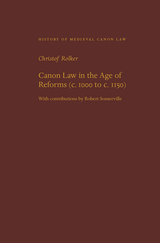
Canon Law in the Age of Reforms (c. 1000 to c. 1150)
Christof Rolker
Catholic University of America Press, 2023
This monograph addresses the history of canon law in Western Europe between ca. 1000 and ca. 1150, specifically the collections compiled and the councils held in that time. The main part consists of an analysis of all major collections, taking into account their formal and material sources, the social and political context of their origin, the manuscript transmission, and their reception more generally. As most collections are not available in reliable editions, a considerable part of the discussion involves the analysis of medieval manuscripts. Specialized research is available for many but not all these works, but tends to be scattered across miscellaneous publications in English, German, French, Italian, and Spanish; one purpose of the book is thus to provide relatively uniform, up-to-date accounts of all major collections of the period. At the same time, the book argues that the collections are much more directly influenced by the social milieux from which they emerged, and that more groups were involved in the development of high medieval canon law than it has previously been thought. In particular, the book seeks to replace the still widely held belief that the development of canon law in the century before Gratian’s Decretum (ca. 1140) was largely driven by the Reform papacy. Instead, it is crucial to take into account the contribution of bishops, monks, and other groups with often conflicting interests. Put briefly, local needs and conflicts played a considerably more important role than central (papal) ‘reform’, on which older scholarship has largely focused.
[more]
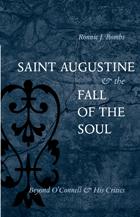
Saint Augustine and the Fall of the Soul
Beyond O'Connell & His Critics
Ronnie J. Rombs
Catholic University of America Press, 2006
Saint Augustine and the Fall of the Soul: Beyond O'Connell and His Critics provides first a critical examination of O'Connell's theses in a readable summary of his work that spanned over thirty years.
[more]
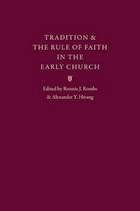
Tradition and the Rule of Faith in the Early Church
Ronnie J. Rombs
Catholic University of America Press, 2011
Tradition and the rule of faith are particularly apt themes for this collection of studies. The essays are written in honor of Joseph T. Lienhard, S.J., renowned American patristic scholar whose research and writings have focused on this particular theme.
[more]
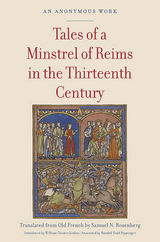
Tales of a Minstrel of Reims in the Thirteenth Century
Samuel N. Rosenberg
Catholic University of America Press, 2021
An anonymous minstrel in thirteenth-century France composed this gripping account of historical events in his time. Crusaders and Muslim forces battle for control of the Holy Land, while power struggles rage between and among religious authorities and their conflicting secular counterparts, pope and German emperor, the kings of England and the kings of France. Meanwhile, the kings cannot count on their independent-minded barons to support or even tolerate the royal ambitions. Although politics (and the collapse of a royal marriage) frame the narrative, the logistics of war are also in play: competing military machinery and the challenges of transporting troops and matariel. Inevitably, the civilian population suffers.
The minstrel was a professional story-teller, and his livelihood likely depended on his ability to captivate an audience. Beyond would-be objective reporting, the minstrel dramatizes events through dialogue, while he delves into the motives and intentions of important figures, and imparts traditional moral guidance. We follow the deeds of many prominent women and witness striking episodes in the lives of Eleanor of Aquitaine, Richard the Lionhearted, Blanche of Castile, Frederick the Great, Saladin, and others. These tales survive in several manuscripts, suggesting that they enjoyed significant success and popularity in their day.
Samuel N. Rosenberg produced this first scholarly translation of the Old French tales into English. References that might have been obvious to the minstrel’s original audience are explained for the modern reader in the indispensable annotations of medieval historian Randall Todd Pippenger. The introduction by eminent medievalist William Chester Jordan places the minstrel’s work in historical context and discusses the surviving manuscript sources.
[more]
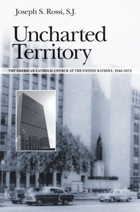
Uncharted Territory
The American Catholic Church at the United Nations, 1946-1972
Joseph S. Rossi S.J.
Catholic University of America Press, 2006
Uncharted Territory chronicles the groundbreaking attempt by the National Catholic Welfare Conference (NCWC) to mold the United Nations in the image of a Catholic world order through the NCWC Office for UN Affairs.
[more]
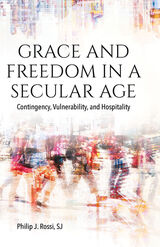
Grace and Freedom in a Secular Age
Contingency, Vulnerability, and Hospitality
Philip J. Rossi
Catholic University of America Press, 2022
In the course of a long and distinguished academic and civic career, the Canadian philosopher Charles Taylor has been, for articulate atheists and learned believers alike, an incisive, insightful, gracious, and challenging conversation partner on issues that arise at the intersection and interaction of religion, society, and culture.
Grace and Freedom in a Secular Age offers a concise exposition of key ideas – contingency, otherness, freedom, vulnerability and mutuality – that inform his probing analyses of the dynamics of religious belief and religious denial in the pervasive contemporary culture he calls a “a secular age,” within which religious belief and practice have, for many, become just an option. Those ideas provide the basis from which Rossi argues that, despite a clear-eyed recognition of the deep fractures of meaning and the pervasive fragmentation of once stable societal connections that a secular age has brought in its wake, Taylor also sees and affirms strong grounds for hope in a healing of our broken and fractured world and for the possibilities—and the importance of—active human participation in that healing. Taylor points to signs indicative of potent re-compositions and renewals taking place in religious belief and practice from its interaction with the dynamics of secular culture, particularly ones that make possible radical enactments of deeper human solidarity and mutuality, of which the one most often potent is the reconciliation of enemies. In pointing out these signs, Taylor suggests a richly expansive reading of the Christian doctrine of Creation, as it marks the radical contingency of all that is upon a freely bestowed divine self-giving: Creation is the ongoing enactment of the divine hospitality of the Triune God.
[more]
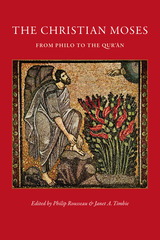
The Christian Moses
Phillip Rousseau
Catholic University of America Press, 2019
As it developed an increasingly distinctive character of its own during the first six centuries of the common era, Christianity was constantly forced to reassess and adapt its relationship with the Jewish tradition. The process involved a number of preoccupations and challenges: the status of biblical and parabiblical texts (several of them already debatable in Jewish eyes), the nature and purposes of God, patterns of prayer (both personal and liturgical), ritual practices, ethical norms, the acquisition and exercise of religious authority, and the presentation of a religious “face” to the very different culture that surrounded and in many ways dominated both Christians and Jews.
The essays in this volume were developed within that broad field of inquiry, and indeed make their contribution to it. For, among the many issues already mentioned, there was also that of persons. What was Christianity to do, not just with Adam or Noah, say, but with Abraham, David and Solomon, the great prophetic figures of Jewish history—and, of course, with Moses?
As we move, chapter by chapter, across the early Christian centuries, we see Moses gradually changing in Christian eyes, and at the hands of Christian exegetes and theologians, until he becomes the philosopher par excellence, the forerunner of Plato, the archetype of the lawgiver, the model shepherd of the people of God—yet all on the basis of a scriptural record that Jews would still have been able to recognize.
Written by a range of established scholars, younger and older, many of them highly distinguished, The Christian Moses will appeal to graduate and senior students, to those rooted in a range of disciplines—literary, historical, art historical, as well in theology and exegesis—and to everyone interested in Jewish-Christian relations in this early era.
[more]
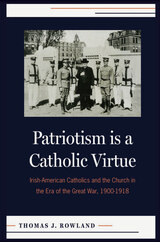
Patriotism is a Catholic Virtue
Irish-American Catholics, The American Church and the Coming of the Great War
Thomas J. Rowland
Catholic University of America Press, 2023
Most of the literature concerning the momentous challenges facing Irish American Catholics in the first two decades of the twentieth century pay but scant attention to the role played in addressing them by the American Church. Among the myriad political, social, cultural and economic issues confronting Irish American Catholics none stand out as prominently as the unabated burden of combatting scurrilous attacks upon them by nativist forces, the task of proving themselves as loyal American citizens, and navigating the perilous waves in advancing the course of directing Irish American nationalism and the cause of Ireland’s freedom.
Patriotism is a Catholic Virtue ferrets out the impact the institutional Church played in affecting the course of action Irish American Catholics took regarding these three crucial missions. Whereas the task of confronting the assaults of nativism, seemingly the natural task for the institutional Church, this study provides extensive evidence of the relentless defense of Catholic virtue conducted by diocesan newspapers. Similarly, the mission of promoting Catholics as loyal American citizens was largely left in the hands of the American hierarchy, its clergy, newspapers and Catholic societies and affiliates. Lastly, this book provides evidence that the Church may well have played the decisive role in guiding its Irish American faithful along paths that, while conservatively promoting Irish nationalism, did not jeopardize an “American First” policy for Catholics. All of this was accomplished in the crucible of an emerging worldwide war.
[more]
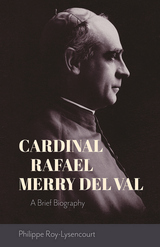
Cardinal Rafael Merry del Val
Philippe Roy-Lysencourt
Catholic University of America Press, 2021
Rafael Merry del Val (1865-1930) was a cardinal of the Roman Catholic Church who had one of the most dazzling careers in ecclesiastical history: he was a secret supernumerary chamberlain at the age of 21, a secret participating chamberlain at the age of 26, an apostolic delegate to Canada at age 31, president of the Academy of Ecclesiastical Nobles and archbishop at age 34, secretary of state for Pius X (1903-1914) and cardinal at age 38, archpriest of St. Peter’s Basilica and prefect of the Fabric of St. Peter at age 48, secretary of the Congregation of the Holy Office at age 49. In 1953, his beatification process was introduced to the Congregation for Rites.
In this study, Philippe Roy-Lysencourt presents the life of this personage, his curial charges, his relations with the popes he served (Leo XIII, Pius X, Benedict XV, and Pius XI), his apostolate, his unexpected death and the furor it caused.
The book includes an inventory of sources for understanding Cardinal Merry del Val’s life, a list of his published writings, as well as a bibliography of the works written about him.
[more]
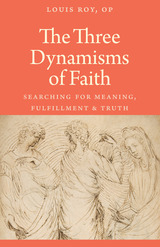
The Three Dynamisms of Faith
Searching for Meaning, Fulfillment, and Truth
Louis Roy
Catholic University of America Press, 2017
Is the faith journey a matter of reflection, of emotion, or of obedience? Is there valid and convincing evidence that does enable human beings to assent to Jesus Christ and his message? What is the influence of cognitive assumptions and of affective tende
[more]
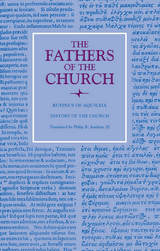
History of the Church
Phillip R. Rufinus of Aquileia
Catholic University of America Press, 2017
Rufinus of Aquileia's History of the Church, published in 402 or 403, is a translation and continuation of that of Eusebius of Caesarea. Eusebius's history tells the story of Christianity from its beginning down to the year 325; Rufinus carries the story forward to 395, the year of the death of Theodosius I. Rufinus demonstrates both a superb understanding of Eusebius's text and a tendency to translate it freely or even to misrepresent it when he judges that it does not do justice to the unity of faith and order which he is convinced is an essential element of the churchs constitution. He excises and rewrites passages liberally, but he retains in his translation Eusebius's revolutionary citation of sources, a historiographical method which would eventually prove so fruitful in the literature of the Latin church.
[more]
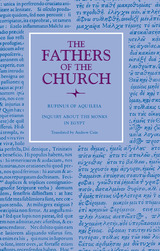
Inquiry about the Monks in Egypt
Rufinus of Aquileia
Catholic University of America Press, 2020
From September 394 to early January 395, seven monks from Rufinus of Aquileia’s monastery on the Mount of Olives made a pilgrimage to Egypt to visit locally renowned monks and monastic communities. Shortly after their return to Jerusalem, one of the party, whose identity remains a mystery, wrote an engaging account of this trip. Although he cast it in the form of a first-person travelogue, it reads more like a book of miracles that depicts the great fourth-century Egyptian monks as prophets and apostles similar to those in the Bible. This work was composed in Greek, yet it is best known today as Historia monachorum in Aegypto (Inquiry about the Monks in Egypt), the title of the Latin translation of this work made by Rufinus, the pilgrim-monks’ abbot.
The Historia monachorum is one of the most fascinating, fantastical, and enigmatic pieces of literature to survive from the patristic period. In both its Greek original and Rufinus’s Latin translation it was one of the most popular and widely disseminated works of monastic hagiography during Late Antiquity and the Middle Ages. Modern scholars value it not only for its intrinsic literary merits but also for its status, alongside Athanasius’s Life of Antony, the Pachomian dossier, and other texts of this ilk, as one of the most important primary sources for monasticism in fourth-century Egypt.
Rufinus’s Historia monachorum is presented here in English translation in its entirety. The introduction and annotations situate the work in its literary, historical, religious, and theological contexts.
[more]

Commentary on the Songs of Songs
Vittorio Rupert of Deutz
Catholic University of America Press, 2024
This is the first English translation of a major work by Rupert of Deutz, arguably the most prolific Christian author since Augustine. During his lifetime, which spanned the eleventh and twelfth centuries, Rupert engaged in controversies on the Eucharist and on predestination and composed works on the Trinity, salvation in Christ, and other major theological topics. An ardent defender of a monastic theology that focused on the interpretation of Scripture and the liturgy, Rupert is well known also for his distinctive hermeneutical approach to the Bible. His Commentary on the Songs of Songs builds on the long Hebrew-Christian tradition of allegorical interpretation of this Old Testament book but adds a radically original dimension to it: it interprets the text as a dialogue between Jesus and Mary and unfolds in this context a novel approach to Mary, who is presented as the teacher of the apostles and assumed to have participated in the Apostolic Council, described in Acts 15.
Rupert has prefaced his commentary with a letter to Thietmar, bishop of Verden (in northern Germany), as well as a prologue in which he reflects on his experience of being called to perform this exegetical task. The complete translation by Jieon Kim and Vittorio Hösle of this major work (up to now translated only into German) is preceded by an introduction that discusses Rupert's life and works, as well as the history of the interpretation of the Song of Songs, and offers hermeneutical reflections on Rupert's methodology.
[more]
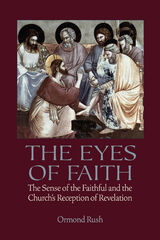
The Eyes of Faith
The Sense of the Faithful and the Church's Reception of Revelation
Ormond Rush
Catholic University of America Press, 2009
The Eyes of Faith presents a systematic theology of the sense of the faithful (sensus fidelium) and shows the fundamental and necessary interrelationship between sensus fidelium, tradition, Scripture, theology, and the magisterium.
[more]
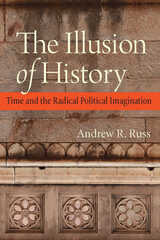
The Illusion of History
Andrew R. Russ
Catholic University of America Press, 2012
Andrew Russ argues in this book that a closer look at their philosophical underpinnings finds that Rousseau, Marx, and Foucault are much less "historical" in their methodology than is widely believed. Instead, they share a more "timeless" view, one indebted to principles ordinarily seen as timeless or transcendent
[more]
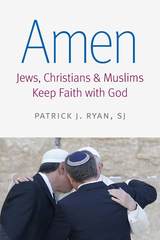
Amen
Patrick J. Ryan SJ
Catholic University of America Press, 2018
Amen: Jews, Christians, and Muslims Keep Faith with God examines faith as it is understood by Jews, Christians and Muslims; it does not aim to be a work of systematic theology or a lengthy explication of the contents of different faith traditions. It offers Jews, Christians and Muslims several approaches to faith as a category of human experience open to God: a faithful God who reaches out to grasp the faithful human being at the same time that the faithful human being reaches out to grasp a faithful God. This two-sided faith, divine and human, lies at the center of each faith tradition. The book examines faith as one might examine a gem, gazing at different facets in turn.
[more]
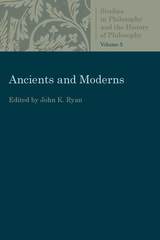
Ancients and Moderns
John K. Ryan
Catholic University of America Press, 2018
This volume is a collection of works by international scholars on Aristotle, Plato, Duns Scotus, Plotinus and Moritz Schlick.
[more]
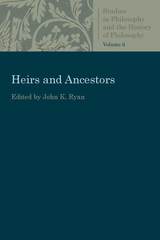
Heirs and Ancestors
John K. Ryan
Catholic University of America Press, 2018
Among the many thinkers discussed in this volume are Sartre, Frankl, Hartshorne, Ortega, Kant, Leibniz, Descartes, John of St. Thomas, Anselm, Bonavanture, Augustine, Plotinus and Aristotle.
[more]
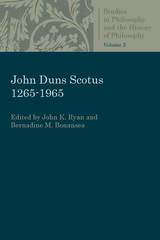
John Duns Scotus 1265-1965
John K. Ryan
Catholic University of America Press, 2018
This volume was a cooperative effort of European, American and Canadian scholars which was published to commemorate the occasion of the seventh centennial of the bith of John Duns Scotus.
[more]
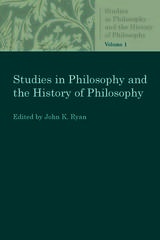
Studies in Philosophy and the History of Philosophy
John K. Ryan
Catholic University of America Press, 2018
The character of this work is perhaps sufficently indicated by its title. However it must be noted that the term "philosophy" is not used so strictly as to exclude material from other disciplines connected with philosophy or helpful to it and to an unders
[more]
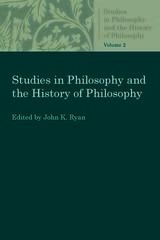
Studies in Philosophy and the History of Philosophy Vol. 2
John K. Ryan
Catholic University of America Press, 2018
The character of this work is perhaps sufficently indicated by its title. However it must be noted that the term "philosophy" is not used so strictly as to exclude material from other disciplines connected with philosophy or helpful to it and to an unders
[more]
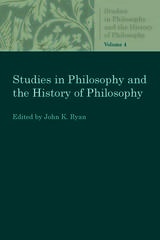
Studies in Philosophy and the History of Philosophy Vol. 4
John K. Ryan
Catholic University of America Press, 2018
The character of this work is perhaps sufficently indicated by its title. However it must be noted that the term "philosophy" is not used so strictly as to exclude material from other disciplines connected with philosophy or helpful to it and to an unders
[more]
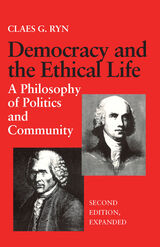
Democracy and the Ethical Life
A Philosophy of Politics and Community (Second Edition, Expanded)
Claes G. Ryn
Catholic University of America Press, 1990
This study goes to the heart of ethics and politics. Strongly argued and lucidly written, the book makes a crucial distinction between two forms of democracy
[more]
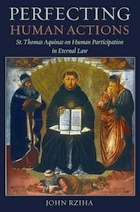
Perfecting Human Actions
St. Thomas Aquinas on Human Participation in Eternal Law
John Rziha
Catholic University of America Press, 2009
READERS
Browse our collection.
PUBLISHERS
See BiblioVault's publisher services.
STUDENT SERVICES
Files for college accessibility offices.
UChicago Accessibility Resources
home | accessibility | search | about | contact us
BiblioVault ® 2001 - 2024
The University of Chicago Press









